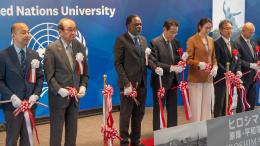UN Secretary-General António Guterres has placed conflict prevention at the top of his agenda. One of the key challenges he will face is that of making Resident Coordinators (RCs) in fragile and conflict-affected countries without peace operations more effective prevention actors.
While so-called “non-mission settings” are widely recognized as the frontline of preventive action (peace operations are usually deployed once efforts to avert outbreak of violent conflict have failed), they also tend to be contexts where the UN faces some of its most acute challenges in making prevention work. This is because RCs, who head the UN’s development presence in such places, face significant political, mandate, and resource constraints in the pursuit of prevention.
Against this background, the UNU Centre for Policy Research, with the support of the UK Mission to the United Nations, has undertaken a research project to extract lessons of RC-supported preventive action in nine countries, where such support has generally been effective.
The project had two central aims: first, to produce analytical narratives of success stories, detailing how RCs and UN Country Teams (UNCTs) have effectively engaged across various settings in a preventive manner; and second, to identify good practices of what has worked in RC-supported prevention in the past, and how those lessons might be relevant to RCs in other settings.
The lessons, findings and recommendations emerging from the nine case studies are synthesized in a Policy Paper, What Works in UN Resident Coordinator-Led Conflict Prevention: Lessons from the Field, by Sebastian von Einsiedel.
We hope this research will provide insights and inspiration to all UN actors seeking to enhance the Organisation’s performance in “upstream” conflict prevention. These include: Resident Coordinators and their staff deployed in countries facing risks to their stability; members of UN Country Teams; entities at UN Headquarters tasked with supporting RCs and UNCTs in their prevention roles; UN member states; and relevant think tanks.
Download
-
Case Study: Bolivia 2000-09 by Cale Salih
-
Case Study: Colombia 2012-16 by Cale Salih
-
Case Study: Guinea 2009-15 by Josie Lianna Kaye
-
Case Study: Guyana 2003-15 by Wendy MacClinchy
-
Case Study: Kenya 2008-17 by Wendy MacClinchy
-
Case Study: Kyrgyzstan 2010-17 by Josie Lianna Kaye
-
Case Study: Malawi, 2011-17 by Francesco Galtieri
-
Case Study: Nepal 2007-15 by Sebastian von Einsiedel
-
Case Study: Tunisia 2011-17 by Josie Lianna Kaye


